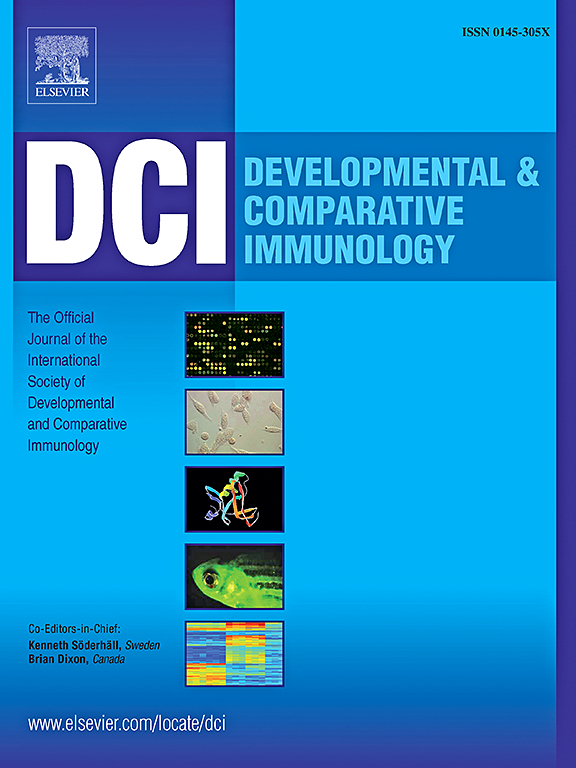Cd36 deficiency enhances the immune defence against Grass Carp Reovirus in zebrafish
IF 2.4
3区 农林科学
Q1 FISHERIES
引用次数: 0
Abstract
CD36, a single-chain transmembrane glycoprotein belonging to the class B scavenger receptor family, remains enigmatic in terms of its antiviral immune function, with some conflicting conclusions. This study aims to elucidate the role of Cd36 in antiviral immunity using zebrafish as a model organism. We generated cd36−/− zebrafish mutants using CRISPR/Cas9 technology and challenged them with Grass Carp Reovirus (GCRV), a dsRNA virus. Compared to wild-type (WT) zebrafish, cd36−/− zebrafish exhibited stronger antiviral immunity, reduced viral load, and lower mortality. Transcriptome sequencing analysis of liver tissue revealed that the differentially expressed genes (DEGs) between WT and cd36−/− zebrafish were primarily enriched in metabolic pathways, such as glycan biosynthesis and fatty acid metabolism. This suggests that Cd36 may modulate antiviral immune responses by influencing metabolic activities. Our findings provide a foundation for further investigations into the functional and molecular mechanisms of Cd36 in antiviral immunity in fish.
缺乏Cd36增强斑马鱼对草鱼呼肠孤病毒的免疫防御
CD36是一种单链跨膜糖蛋白,属于B类清道夫受体家族,其抗病毒免疫功能仍然是一个谜,一些相互矛盾的结论。本研究旨在以斑马鱼为模型生物阐明Cd36在抗病毒免疫中的作用。我们使用CRISPR/Cas9技术生成cd36−/−斑马鱼突变体,并用草鱼呼肠孤病毒(GCRV)(一种dsRNA病毒)攻击它们。与野生型(WT)斑马鱼相比,cd36−/−斑马鱼表现出更强的抗病毒免疫,更低的病毒载量和更低的死亡率。肝脏组织转录组测序分析显示,WT和cd36−/−斑马鱼之间的差异表达基因(DEGs)主要富集在糖生物合成和脂肪酸代谢等代谢途径中。这表明Cd36可能通过影响代谢活动来调节抗病毒免疫反应。本研究为进一步研究Cd36在鱼类抗病毒免疫中的功能和分子机制奠定了基础。
本文章由计算机程序翻译,如有差异,请以英文原文为准。
求助全文
约1分钟内获得全文
求助全文
来源期刊
CiteScore
6.20
自引率
6.90%
发文量
206
审稿时长
49 days
期刊介绍:
Developmental and Comparative Immunology (DCI) is an international journal that publishes articles describing original research in all areas of immunology, including comparative aspects of immunity and the evolution and development of the immune system. Manuscripts describing studies of immune systems in both vertebrates and invertebrates are welcome. All levels of immunological investigations are appropriate: organismal, cellular, biochemical and molecular genetics, extending to such fields as aging of the immune system, interaction between the immune and neuroendocrine system and intestinal immunity.

 求助内容:
求助内容: 应助结果提醒方式:
应助结果提醒方式:


